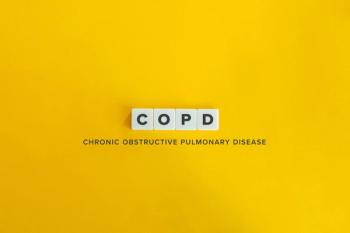
COPD Exacerbations Reduced Substantially With Dupilumab, Phase 3 Data Shows
The NOTUS trial was shown to have successfully achieved its primary endpoint, demonstrating the notable efficacy of dupilumab in reducing exacerbations by 34% versus placebo in individuals with moderate-to-severe COPD showing evidence of type 2 inflammation.
Regeneron Pharmaceuticals, Inc., and Sanofi announced new phase 3 data indicating dupilumab (Dupixent) leads to substantial reductions in exacerbations of chronic obstructive pulmonary disease (COPD), adding to its future potential as the first approved COPD biologic treatment.1
“We are highly encouraged by these remarkable results from NOTUS showing a 34% reduction in COPD exacerbations compared to placebo, confirming the unprecedented results from our first Phase 3 trial, BOREAS,” George D. Yancopoulos, MD, PhD, Regeneron’s president, board co-chair, and chief scientific officer as well as a principal inventor of the drug, said in a statement.1
Early in 2023, the US Food and Drug Administration (FDA) awarded Breakthrough Therapy designation to the drug as an adjunctive maintenance therapy for adults experiencing uncontrolled COPD due to the BOREAS study findings. Yancopoulos noted that the NOTUS results showed the importance of addressing type 2 inflammation in chronic and debilitating diseases, noting that the company is working toward submitting such data to the FDA.
The new NOTUS trial was shown to have successfully achieved its primary endpoint, demonstrating the notable efficacy of dupilumab in reducing exacerbations by 34% versus placebo in individuals with moderate-to-severe COPD showing evidence of type 2 inflammation (defined as blood eosinophils ≥300 cells per μL). This new data also aligns with the outcomes seen in the pivotal BOREAS trial.
The NOTUS study was shown to have affirmed that dupilumab therapy resulted in rapid and enduring lung function enhancements, noting that such improvements were seen at both 12 and then 52 weeks. The drug showed rapid and significant lung function enhancement, with the investigators observing a 139 mL increase in FEV1 at the 12-week mark, a notable surpassing of the placebo's 57 mL improvement in patients’ FEV1.
“This is the first and only time an investigational biologic in COPD has shown a significant and clinically meaningful reduction…we are pleased that we can potentially deliver Dupixent faster to patients in need where no new advancements have been identified in over a decade,” Naimish Patel, MD, the head of global development, immunology and inflammation at Sanofi, said in a statement.1
The NOTUS study involved 935 adult participants in the age range of 40 - 85, with current or former smokers, and they were randomly assigned to either be given dupilumab (n=470) or a placebo (n=465) that was added to standard-of-care inhaled therapy. The recipients ended up showing a 34% reduction in moderate or severe acute exacerbations in COPD over the course of 52 weeks (P=0.0002).
The investigators also found that lung function was shown to have improved from baseline by 139 mL at the 12-week mark versus 57 mL for those in the placebo arm (P=0.0001). The noted benefits were also found to have been continued at 52 weeks, with 115 mL for treatment compared to 54 mL for placebo, (P=0.0182).
The safety data in this study aligned with that of the known profile of dupilumab, with rates of adverse event rates being 67% and 66% for treatment versus placebo, respectively.
“These data validate our belief that Dupixent has the potential to transform the treatment of moderate-to-severe COPD and given the significant unmet needs for patients with uncontrolled COPD, we are not stopping with Dupixent,” Patel said in a statement.1 “Our second program in COPD, itepekimab, continues with data expected in 2025. If positive, Dupixent and itepekimab could emerge as treatments for approximately 80% of those suffering from moderate-to-severe COPD with recurrent exacerbations.”
Around 300,000 patients found in the US are known to struggle with uncontrolled COPD and with potential type 2 inflammation, with no novel treatment methodologies being given FDA-approval for over 10 years. Sanofi and Regeneron plan to submit the NOTUS data as well as the BOREAS data to the FDA by the end of 2023.
References
1. Dupixent® (dupilumab) Significantly Reduced COPD Exacerbations in Second Positive Phase 3 Trial, Accelerating FDA Submission and Confirming Potential to Become First Approved Biologic for This Serious Disease. Regeneron. November 27, 2023. Date accessed: November 27, 2023. https://investor.regeneron.com/news-releases/news-release-details/dupixentr-dupilumab-significantly-reduced-copd-exacerbations.
Newsletter
Pharmacy practice is always changing. Stay ahead of the curve with the Drug Topics newsletter and get the latest drug information, industry trends, and patient care tips.























